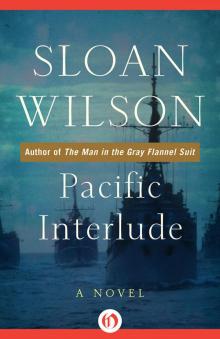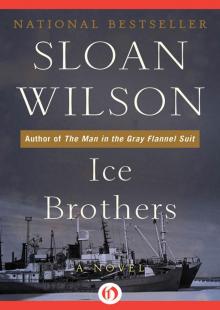- Home
- Sloan Wilson
Pacific Interlude Page 4
Pacific Interlude Read online
Page 4
In his mind’s eye, Syl saw a Jap plane dive from the clouds, the guns on the lead edge of her wings flickering. He saw the tracers arch toward the tank deck, the first splash of fire and the final explosion before oblivion.
“A coward dies a thousand deaths, a brave man dies but once.” He had read that in school long ago. Well, he knew that he would have a thousand deaths.
Except he really must not let himself concoct such stuff. He would have to have a little faith. In what? He had never thought about religion much. Someone or something had obviously created the world and everyone in it, but it seemed arrogant to assume that God was going to protect him while letting so many good men die on battlefields all over Europe and Asia. Men in war had to take their chances and some had to take more chances than others.
He knew men who believed that many might die, but never them, and he wished he could assume that he had some invisible mantle of protection, but he had never been able to talk himself into it. Aboard his subchaser and his little freighter, he had believed simply in the law of averages and probability. Those had not been very dangerous ships, and at least ninety-nine out of a hundred would survive the war, he had guessed. The statistics were not likely to be anywhere near as good for gas tankers. Of course, no actual figures on the loss of ships of various kinds were available to him. The government kept such matters top secret, but he had learned over a period of time that most of the scuttlebutt about sinkings was right. Only rumors about bloodless victories and peacefeelers turned out to be inaccurate.
So his mind, after putting together all the facts he knew about the Y-18 and the job she was to do, told him that he just might not survive this war. Probably not. He would just have to live with that. There was no point in writing letters home saying, “We who are about to die salute you.” No self-pity, please. Many men in this war learned to live with the knowledge that the odds were all against them.
How did they do it? It was fun to be cocky when strolling the streets, but what did they do at night when they came to bed and lay staring at the ceiling?
There was, perhaps, a black alternative to faith, Syl thought. Who said long life was so great? Was it for most people? Youth was supposed to be the best part of it, and he’d had that. What about middle age? For his father it had meant the agony of trying to pay bills in the midst of the Depression, taking care of a wife who had often suffered depressions of her own, working endlessly to please deans and students while trying to write history books at night that would stack up against the competition—if his father had died at the age of twenty-five aboard his World War One subchaser, he might have been a lot better off … It was all very well for him to live with pretty, proper dreams of going home to Sally, but how was that marriage really likely to turn out? During the three years of their marriage, almost all of which he had spent at sea, they had discovered in their letters and brief reunions that they were frighteningly different kinds of people. Her main ambition was to have a house on a quiet street in Stamford, Connecticut, like that of her parents, and three kids. She made it no secret that she hoped he would give up his early ambition for an academic career and go to work in her father’s insurance agency, where, she kept pointing out, he could soon make much more money than he ever could make as a history professor.
And he, what did he want? A career in selling insurance and suburban bliss horrified him, but so did the thought of a routine academic career like his father’s. He was, to be honest, a sort of adventurer, he wanted adventures both of the body and the mind, and although that sounded absurd, it was plain true. As an undergraduate he had been inspired by the career of Samuel Eliot Morison, a Harvard historian who had sailed a small ship in the wake of Columbus to gain insight into the discovery of the New World. Morison was now a flag officer watching the navy make history—which he would soon write. Historians did not have to spend their lives in musty classrooms. His longtime love of the sea and his experience as a Coast Guard officer could come in handy if he finished the requirements for his Ph.D. in history. He had actually written a plan for following in the wakes of the old Viking ships which had explored America long before Columbus. The Vikings also had made their way up the Volga River far into Russia, and he would follow them. He would be a scholar-adventurer or an adventurer-scholar. Sally had cried, for God’s sake, when he told her these fantasies. There would never be any money in it, she said, and anyway, how could he just stand there and tell her that he wanted nothing more than a way of life that would keep him away from her?
“You could come with me,” he had said.
“On some kind of damn Viking boat? Would you want me to take our babies with us too?”
“I think the Vikings sometimes traveled with women and children—”
“Fuck the Vikings,” she had shouted back in a rare outburst of profanity. “I want to have a house, right here in Stamford where I can get diaper service. Sorry about that, my Viking, but that’s the kind of girl I am …”
“He’d not found a way to convince her that following in the wake of the Vikings might be better than Stamford diaper service. After she had stopped crying, they had tried to resolve their differences by making love, but after a while that had not worked very well either …
So fantasies of a happy bride awaiting at home were almost surely unrealistic. So, in all probability, were his schemes of becoming a scholar-adventurer. Probably no foundation or university would finance a long voyage by an unknown young historian and he could slave away for a lifetime before getting the necessary reputation. With the pressure Sally would put on him to buy the suburban house and all that went with it, he might quit dreaming and spend his life trying to con people into buying insurance. Was an early death in a burst of fire on the Y-18 so terrible compared to that?
Yes and no. No for the reasons he’d just run through. Yes because death was no acceptable bargain. Not really. The trouble was he kept having some good memories too. There was the one, for instance, of that special evening Sally had prepared for him in St. Augustine, Florida, just before he graduated from the Advanced Officers’ Training School there.
He had come home to their rented bungalow at about five in the afternoon, as he usually had during the six weeks they had had together there. The prospect of his going to sea again soon had depressed Sally and she had occupied her time when he was at classes making dresses on an old-fashioned treadle sewing machine which had come with the house. For two days she had been angry at him because he had brought pilot books of the South Pacific home and had made the mistake of reading tidbits of island history to her and showing her on a chart where many of the army ships which the Coast Guard was being asked to man were being ordered to go.
“Damn it, you love all this,” she had said. “You’re not just following orders. If the damn Coast Guard ordered you to stay at home, you’d desert.”
“That’s not true—”
“Then why do you spend even your evenings pouring over charts and those damn books?”
“Honey, I’m a navigator. The science of navigation has always fascinated me. I’m good at it. They’ve even got me helping the instructor who is trying to show a lot of the guys how to get out there.”
“I’m proud of you for being so good at it,” she had said, “but do you have to be so damn enthusiastic …?”
The next afternoon when he came home she surprised him by greeting him at the door in a new outfit she had made, a red skirt which was more flamboyant than her usual taste and a satin blouse with a low neckline instead of the primmer styles which she had long favored. Her hair, which was cut in a pageboy bob, had been brushed until it glistened.
“You look great,” he said. “Are we going out?”
“No, I’ve fixed a little surprise for you. I’m going to serve dinner on the terrace out back. I don’t know why we’ve never eaten out there before.”
The terrace was small but spectacularly beautiful that day. Two orange trees near it were in bloom and so was a flame vine
on the adjacent side of the house. She had covered a card table with a damask cloth and on a nearby bench had set up a little bar.
“This is great,” he said. “Are we having guests?”
“You and me. Would you like a martini?”
“I would.”
“I think I’ll have one too.”
Usually she did not drink at all and when she did she generally stuck with a glass of white wine. The only times he had known her to drink martinis were just before one of the rare occasions when she initiated sex. That martini was a signal and from her enigmatic smile, he guessed that she knew that and offered it as such.
“I am probably the only man alive who keeps hoping that his wife will drink more,” he said, and mixed two dry martinis.
“This tastes good,” she said, instead of making her usual wry face at the first sip. “I heard something today that might interest you. This school is going to be expanded. The Coast Guard is going to get a lot more army ships—”
“I’ve heard that scuttlebutt.”
“This is more than scuttlebutt. I had lunch with Commander Halston’s wife.”
“Oh?”
“She’s very nice. She went to Connecticut College and she knew some of my sister’s friends there.”
“Did she tell you anything else?”
“They are going to appoint some new instructors, including a teacher of navigation. Oh, Syl, she said that if you put in for it, you’d have a good chance—”
“Those jobs usually go to regulars.”
“Not always. You were on the Greenland Patrol and so was Commander Halston. He has a special place in his heart for all you old ice brothers, Helen said.”
“I never met him up there.”
“But he knows your record. And beyond that, you had a little college teaching. How many professional teachers do they have here?”
“A semester of teaching freshman history wouldn’t help much.”
“Stop putting yourself down! You’ve got to put in for it and you’ve got to go see the commander. Promise me you will.”
The idea of staying in Florida to teach navigation for the duration did not appeal to Syl. What he wanted was to take command of a fine new army freighter and sail her out to the South Sea islands and New Guinea, but he suspected that if he told his wife that, she would throw her martini in his face. At least she would not finish it and all that might follow would never happen.
“I’ll write a letter,” he said.
“You’ve also got to go see Commander Halston. You have to push for a thing like this.”
“Okay.”
Probably a letter and a visit to the commander would do no good at all, he reflected, especially if he confided to the commander that he really wanted to go to sea. The truth was he was lying to Sally to get sex and that didn’t make him feel very good when he thought about it, but on the other hand, she was using sex to make him do what she wanted. Which was kind of exciting. As a matter of fact, in the past she had seduced him into buying a new sofa and later, a new car. During these sessions she had been much more uninhibited than she usually was and had appeared to get more intense satisfaction. He’d read or heard that some women enjoy playing the part of a prostitute and wondered if bartering sex for something she wanted from her husband somehow released more in Sally than either of them knew. He had tried so hard so often to talk her into bed that it was especially stimulating just to sit back and let her seduce him … for whatever damn reason.
“Will you go see the commander tomorrow morning?”
“Sure.”
“I think I’ll have another martini,” she said, draining her glass and holding it out. While he was filling it, she undid the top button of her new blouse, deepening the cleavage. God, she had beautiful breasts. Right now he could forgive her anything. Including her vision of him as an insurance whizbang for her daddy …
After handing her a second martini he poured a glass of white wine for himself. He had learned that although two or three cocktails improved her performance in bed, they did nothing for his own. She noticed this precaution he was taking, just smiled without comment. Her dark eyes were comment enough.
“We could finish out the whole war right here,” she said.
“It’s possible.”
“You know, Mutual has an office here. Dad knows a lot of people in their headquarters. I could probably get a job selling insurance.”
“Do you want that?”
“In a few months I might be able to make quite a little. Syl, if you’re not going overseas there’s no reason why we couldn’t start a family right away.”
He felt panicky. “First we ought to make sure of what my orders will be,” he said. “Don’t count your chickens—”
“There’s no harm in dreaming, is there? How long do you think it will be before you make lieutenant-commander?”
“God knows.”
“If you help to organize the expansion of this school, you might get a spot promotion.”
“An outside possibility.”
“Syl, there’s a nice old Victorian house down near the waterfront for sale cheap. It’s got four bedrooms. If we stay here long enough, we might need them.”
There was nothing wrong in her wanting to have a family soon, he told himself. She was driven by strong instinct, just as he was now. But why did something as glorious as sheer lust have to lead to anything so dull as a shore job, buying a house in St. Augustine and the diaper service?
“It sounds like a good deal … but I don’t think we should think about starting a family or buying a house until things are a little more definite,” he said.
“Even if you do go off, maybe you should leave me pregnant. I think I might like that. We have enough money to get by as things are. Muth would be tickled to have me live with her and dad.”
He did not want Muth to be tickled with the result that he would be trapped forever, maybe in the insurance business. Still, there was a look in Sally’s eyes which was undeniable.
Leaning over, she put a hand on his knee and caressed it softly, her fingers wandering to his thigh. She had never done that before. The orange blossoms and the other flowers surrounding the terrace smelled very sweet. Bees hummed, a mocking bird called. The works.
She took a sip from her glass and put it down on the table, nervously.
“Come sit on my lap,” he said.
She did, perched there tensely while he undid two more buttons of her blouse and pressed his face between her breasts. Glancing toward the house which stood a hundred yards away on the other side of the orange trees, she said, “I’ll do anything you want me to, but not here.”
He picked her up, something he’d not tried since their wedding night, and carried her inside.
“You better let me turn the stove off,” she said.
He put her down and she turned the knobs under three steaming pots. Then she slowly unbuttoned the remaining buttons of her blouse and took it off. Looking down thoughtfully, she next took off her bra there in the kitchen, a surprising thing for so shy and reserved a young woman as Sally to do. Standing there in a shaft of late afternoon sunlight, in only her red skirt, she folded her arms over her head, turned toward him and said, “Now, do you think you’ll find anyone so much better in the South Sea Islands?”
“No,” he said with an exuberant laugh and carried her to the bedroom.
They’d had a great night, the kind he had fantasized when he had first asked her to marry him, but a very bad one for him to remember now a little more than a year later when he was trying to convince himself that it should be easy to be brave because life was not, after all, that much worth living …
In the end maybe everything was more a matter of luck than anything else. She had not gotten pregnant, much as she had tried. If she had, he told himself, he might have tried harder to wangle the shore job she wanted for him. He had, as he had promised her, gone to see the commander, who had encouraged him to talk to the captain in charge of
the whole base. This he had never done and in due course he had gotten his orders, first to command the FS 798 and then the Y-18.
Maybe I’m just a jerk … If I hadn’t been such a damn fool I’d now be lying with Sally on the beach in St. Augustine or sitting with her on that terrace with a shaker of cold martinis. But that was not being very realistic. In their whole marriage they had only one or two great nights like that. As soon as she found out that she was not pregnant and that he was going overseas after all, she had begun sighing a lot and saying she had a headache. If he ever got home to her and she found that he had plans other than selling insurance in Stamford with her father, life would probably be one long headache for both of them. He had no right to blame her for this—she should marry an insurance man. He himself probably had no right to have any wife at all if he wanted to wander around the world all his life …
Suddenly he felt almost violently restless and kicked off his covers. Did he really have to accept the likely death sentence of being assigned to the Y-18? Like a woman who did not want to make love, a man who did not want to fight for life in a war could get constant headaches and backaches. If he complained enough to some doctor here in Brisbane, the word would be sent to the personnel officer in New Guinea and a replacement would arrive. Headquarters didn’t want skippers who were chronically ill. No one was forced to command a ship. So why not just beg off this crazy assignment?
He would not do that because he would not do that. Not much of an answer, but it was the truth. He remembered his father telling him that the Grants and his mother’s people, the Garricks, had fought in every American war and probably in the wars of England and Germany, where they came from, back through the centuries … “Wars never make much sense if you try to find fancy causes for them,” his father Charles had said. “No country is morally much superior to any other, if you think of history, and the battles over religion and politics always seem ridiculous in retrospect. One fact remains: it’s the nature of any human society to expand until it collides with another. It then is repulsed or swallows the other. A nation without enough good fighting men is bound to be swallowed. In time of peace no one likes fighting men—they are a reproach to our morality. But when the bugle blows as it does and will in almost every generation, a nation stands or falls according to the strength of its fighting men. Nowadays industry and science have a lot to do with the fighting of wars, but they would be useless without the cutting edge of fighting men. Never be ashamed that all your people have been fighting men. Your mother’s maiden name, Garrick, means ‘mighty warrior’ in Teutonic and ‘Grant’ means great, as old U. S. Grant, Unconditional Surrender Grant himself, was on the battlefield. He’s only a distant, collateral ancestor of ours, but we are of the same stock. We don’t panic in time of war. Everyone wonders how he’d act under fire, but I’ll tell you right now how you’ll feel. Your fear will go when the first shot is fired. The action will all seem to slow down, no matter how fast it is, and your mind will have plenty of time to think. You’ll feel something that’s more than excitement, a sense that this is the kind of job you were born to do and no man can do it better. I don’t mean you’ll go charging ahead recklessly—your mind will work out all the advantages for you and your men. You will attack only when you can win and retreat only to fight again.”

 A Summer Place
A Summer Place Pacific Interlude
Pacific Interlude Man in the Gray Flannel Suit
Man in the Gray Flannel Suit Ice Brothers
Ice Brothers